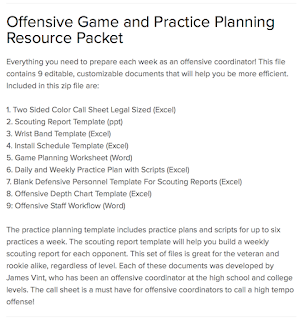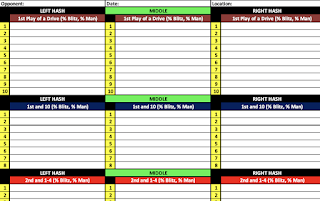Coaches that enjoy consistent, long-term success at an elite level have one very important secret to their success. These elite coaches are not accidentally successful. Success didn't just happen. They understand that success and high level performance comes from consistent, intentional accountability from everyone in the organization.
Consistent Accountability comes down to three principles. First, you have clear standards of performance. Your standards are clearly laid out and everyone in the organization understands the standards. Second is consistent accountability to the standards. Every single person is held accountable to the standard. Third, you care enough about people to have difficult conversations.
Clearly Defined Standards
Your standards must be clearly laid out, and everyone must understand and know the standard. If they know the standard and understand it, they will know when they don't meet it. The problem lies when they think they met the standard, but didn’t, and it wasn't clearly defined. This is when you, as a coach, have to teach the standard in a different way. The greatest teachers know that not everyone learns the same way. Most people tend to be visual learners, but others are auditory. A good percentage of athletes are a combination of visual and kinesthetic learners. This means they have to see and do before they learn a skill.
I once heard a coach say, "telling isn't teaching." Just because you tell someone something, doesn't mean they learned it. How many times have you heard a coach say, "well I told him." That is not coaching. That is telling. And that should never be our excuse. How do you know they learned what your are teaching? You have to obtain feedback. Instead of asking if they understand, ask them a question with a specific answer. If you told them to arrive by 2pm, don't say, "do you understand?" Replace that with, "what time do you have to be here?" If they say 2pm, you know they learned the expectation.
When you teach, you need to have coaching points. The business world calls them bullet points. What are your buzz words that kids must learn? This helps them to remember, retain, and recall information.
If your players don't know the expectations, how can they meet them? You cannot assume something is understood by everyone if you haven't laid it out clearly. You most likely will have to repeat the standard over and over again. But if you never define the standard, don't be upset when your players don't reach it.
Consistent Accountability
Every single person must be held accountable to the standard. There are two things I see in organizations that destroy trust. First, some athletes are held to the standard while others are not. And second, the standards change based on which coach the athlete is with at that moment.
If you hold one person to the standard but you don't hold another person accountable, you are going to be frustrated. Your team is going to be frustrated. If you have a standard that says no one will wear earrings in the weight room, and you allow one athlete to wear earrings in the weight room, tomorrow you will have 5 people wearing earrings in the weight room. Permitting is promoting. Now you have lost the standard. You have two choices. You can either reteach the standard and tell the athletes you are going to hold them accountable and actually do it. Or, you can get rid of the standard. The best way is to consistently hold people accountable to meeting your standard.

A standard that I see consistently violated on average teams is the "no one walks off the field" standard. You go to their practice, and you see guys walking off the field. Then you watch them in a game, and guys are walking off the field. If your standard is that you jog off the field, then hold guys accountable to the standard. Teach them the standard in practice. Don't wait until games to try to teach a standard. Do a drill in practice where they have to jog off the field. Remember, what you permit, you promote.
The second issue comes when one coach holds an athlete accountable and another does not. I see this a lot with parallel squat. One coach is making sure athletes get to parallel, while another coach accepts a squat that is above parallel. There needs to be consistent accountability from coaches for standards of performance to mean anything. Each coach must be clear on the standards and hold athletes accountable.
Care Enough To Have Difficult Conversations
A sure fire way to show an athlete you don't really care about them is to allow them to not meet the standard. I have seen this at a lot of programs and it always involves guys that are considered really good players. Coaches must be willing to hold their best players accountable. If you don't, you not only hurt the program, but you hurt the kid. When you let things go with your best players, accountability is lost for everyone.
Nick Saban talked about how special his team was this year. It was special because his best players were accountable to the standard and led others. When your best players are your best people, you will have something special. But a big part of this came from those players having consistent accountability. They were held accountable to meeting the standards, every single day. They were coached with intentionality.
Players will rise or fall to the level of accountability to the expectations. If you have high expectations and high accountability, you will have a high performing organization. If you have high expectations and low accountability, you will always fall short of your expectations.

Players want structure and accountability. They want someone to care about them enough to set high expectations for them. They also want someone to care enough about them to hold them to those expectations. The biggest reason coaches don't want to have these conversations is that they don't want conflict. Listen, if you don't want conflict then don't be a coach. Go be a gardener. But you don't have to confront mediocrity in such a way that causes a lot of conflict. There are athletes who will test you. "Will coach really hold me accountable?" When they know you will, they will rise to the level of the accountability to the standard.
Players want you to see the best in them. They want you to love them enough to hold them accountable and push them to be their best.
Meeting The Standard
If someone doesn't meet the standard, it is usually because of one of two reasons. First, they didn't understand the standard of performance. Second, they know there are no consequences and the act will be ignored. This is often when we say the athlete doesn't care. No, they care, they either don't think you are going to hold them accountable, or they are going to test you. Inconsistent accountability is a mistake a lot of coaches make. They have inconsistent standards. The standard changes from athlete to athlete and coach to coach.
Our standards must be consistent and unified across the coaching staff and everyone in the organization. The standard can't change from one day to the next. This confuses our athletes and isn't fair to them. It will also lead to failure. If the athlete doesn't clearly understand the standard, reteach it. The second reason is simple. Hold them accountable. Care about them enough to hold them accountable to meeting the standard and being their best.
As you prepare for your season, begin to evaluate your accountability. Do you have clear standards of performance, and are you holding your athletes consistently accountable? Do you care enough about your athletes to have difficult conversations with them?
I wish you the best as you prepare your team for the upcoming season. I hope this has given you some actionable ideas for your program. Clearly define your standards, and have a consistent, high level of intentional accountability with your players. It will make a difference in your program while having a positive impact on your players.
And remember, it doesn't matter how much or how little talent you have to hold athletes accountable.
Additional Resources:
A few years ago I was speaking at a clinic about our game planning and an FBS coordinator asked me after the talk to go through what we do. I shared with him our offensive game planning resource and he used it through the spring. He emailed me back that it was a game changer. It was an honor to have him use these documents. After speaking at clinics and hearing that more coaches didn't know where to start, I decided to make these available.
Here is a link to my offensive game planning documents: https://sellfy.com/p/AndN/
It includes everything from a scouting report template, to practice plans, to a two-sided color call sheet, and more! Each of the nine documents are fully editable and customizable! Order today and start preparing for your first game right now! At one time this was $99, but it is available right now for less than $13!

Here are a couple of screen shots to show you what our call sheet looks like:


This shows you a small portion of it. It is a fully editable, customizable two sided call sheet. It gives you the ability to better organize and be prepared on game day. It helped us to be better play callers on game day. There are eight other fully customizable documents! Some of the top high school programs in the country use this, as do several college programs!
When I was a defensive coordinator we adapted this to our defensive preparation!
Here is a link to the defensive game planning documents. It includes 12 fully editable and customizable documents. https://sellfy.com/p/AY1u/ These are what we used to post 6 shutouts when I was a defensive coordinator. Defensive coordinators at all levels of football are using this. Again, it is less than $13 right now!

And finally, I put together a special teams resource. This has everything you need, included drill tape, practice tape, and game footage. It includes teaching presentations and scouting forms just for special teams! https://sellfy.com/p/tJwz/ This helped us to build dominating special teams!

I wanted these to be available at a very reasonable cost. These can help you to be more successful on the field and more efficient in the office!
Last year I got hooked up with CoachTube, and put together three courses for offensive football coaches. I put together two courses on RPO's, and a course on Building An Elite System of Communication. All of these courses will help you to score more points!
https://coachtube.com/users/coachvint
All three of these courses are detailed, with everything you need to be more explosive and to score more points.
The course on communication gives you a detailed approach to your gameday communication. I give you a system and a process to improve the quality of conversations, leading to improved play calling on game day. This course has received outstanding reviews from coaches at all level of football. A coach with multiple state titles told me this course helped them to be much more efficient and explosive this season.
My two RPO courses take you through a systematic process of installing RPO's into your offensive system. RPO's put the defense in conflict, forcing them to defend all 53 yards of width and all 6 skill players every single play. I not only give you a system, but I teach you the methods to develop your own RPO concepts.
https://coachtube.com/users/coachvint
New Book
Over the last several months, I have stepped out of my comfort zone and wrote a new book about faith and purpose. The book is available as a paperback on Amazon, and as an eBook for the Kindle App. The cool thing about the Kindle app is that you can read the book on any device. I invite you to read it, and discover the power you receive when you make a decision to walk with the Lord. Here is a link to the book: Finding Faith

Since publishing the book, I have received numerous texts, calls, and emails, from people who are going through similar trials and tribulations. They were feeling many of the same things I was feeling. The found comfort in the book. They also found they had a desire to change and to live better. They wanted more joy.
I would invite you to read the book and discover the possibilities that God has planned for your life.



















